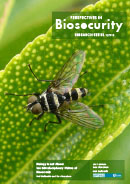 Recognition and management of anthropogenic environmental impacts as ‘biosecurity’ is a relatively new concept to our society. Although biosecurity risks are based on biological impacts, biosecurity management is truly interdisciplinary-transdisciplinary since the definition and interpretation of risk and adverse effects are socially constructed, and the outcomes and management of the risks can have significant social and economic impacts. The New Zealand biosecurity strategy is very clear that the responsibilities for environmental risk management lie with society as a whole. The authors explore how disciplines other than biology may contribute to the understanding of biosecurity risks, their management and mitigation. This paper outlines the interdisciplinary-transdisciplinary nature of biosecurity, with an emphasis on the social and economic elements.
Recognition and management of anthropogenic environmental impacts as ‘biosecurity’ is a relatively new concept to our society. Although biosecurity risks are based on biological impacts, biosecurity management is truly interdisciplinary-transdisciplinary since the definition and interpretation of risk and adverse effects are socially constructed, and the outcomes and management of the risks can have significant social and economic impacts. The New Zealand biosecurity strategy is very clear that the responsibilities for environmental risk management lie with society as a whole. The authors explore how disciplines other than biology may contribute to the understanding of biosecurity risks, their management and mitigation. This paper outlines the interdisciplinary-transdisciplinary nature of biosecurity, with an emphasis on the social and economic elements.
Click here to read the paper
Click here to read other works by Mel Galbraith and Dan Blanchon
Galbraith, M. and Blanchon, D. (2015). Biology is not alone: The interdisciplinary nature of biosecurity. Unitec ePress Perspectives in Biosecurity Research Series (1).
https://doi.org/10.34074/pibs.rs12015
About this series:
Perspectives in Biosecurity is an occasional, multi-disciplinary electronic series of research papers and other outputs covering all aspects of the field of biosecurity, including, but not restricted to: invasion biology and ecology, invasive species identification/diagnostics, management and eradication/control, new invasive species records, modelling, biosecurity law and policy, relationships between human
society and invasive species. Papers in Perspectives in Biosecurity are primarily the results of research carried out by staff, students, graduates, associates, and collaborators of Unitec Institute of Technology. All papers are subject to a double blind peer review process. For more papers in this series please visit: https://www.unitec.ac.nz/epress/index.php/category/publications/epress-series/perspectives-in-biosecurity/